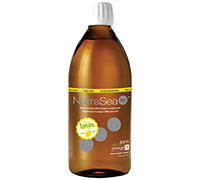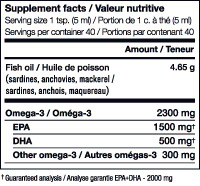
NutraSea Omega-3 High Potency *HP* -- Lemon, 500 ml / 100 Servings
|
Description:
|
|
|
NutraSea"hp" is a high concentration omega-3 formulation with a specially developed EPA:DHA ratio providing maximum therapeutic benefits . The unique and powerful feature of NutraSea"hp" is its 3:1 EPA to DHA ratio which was developed to provide greater therapeutic action. The NutraSea "hp" advantage:
The Inflammation - Disease Connection Inflammation in the body is a result of the production of "Group 2 eicosonoids" including PGE2, LTB4, IL-1, and TNF. This special class of eicosonoids is produced via the enzymatic oxidation of the omega-6 fatty acid AA. Since omega-6 fatty acids are a necessary substrate for the production of "Group 2 eicosonoids", inflammation is highly dependent on the amount of omega-6 in the body. Contrary to omega-6 fatty acids, omega-3 fatty acids play a vital role in attenuating the inflammatory process. The omega-3 fatty acid EPA can be oxidized into "Group 3 eicosonoids" which possess anti-inflammatory properties. Since eicosonoids are short lived chemicals it is important that the body receive a steady supply of EPA to fight inflammation. EPA and DHA also fight chronic over-expression of the inflammatory pathway through a process called competitive inhibition. Every cellular membrane has limited space available for the deposition of fatty acids. A diet high in omega-6 will result in greater amounts of AA in the cellular membrane and therefore increased production of inflammatory "Group 2 eicosonoids". Increasing the amount of omega-3 fatty acids in the diet results in more omega-3 (EPA & DHA) being deposited in the cellular membrane thereby reducing the amount of omega-6. A reduction in the amount of available AA within the cellular membrane results in decreased production of the inflammatory "Group 2 eicosonoids". EPA, DHA, and Neurological Function The body's neurological system is a complex system of electrical transmissions that rely heavily on an adequate supply of omega-3 fatty acids. Both EPA and DHA play important yet different roles in proper functioning of nerve impulses. Although not entirely understood, it is thought that DHA plays predominantly a structural role while EPA plays more of a functional role. A healthy brain and neurological system rely on a life long supply of DHA in the diet. A deficiency in DHA has been linked to numerous neurological disorders including depression, bipolar, Alzheimer's, schizophrenia, and ADHD. Current research has also shown that adequate DHA levels may not be sufficient to combat neurological diseases and that increased EPA intake may play an important therapeutic role. EPA's benefit in neurological function is believed to be due to its role in cell signaling as well as its ability to suppress the inflammatory compounds PGE2, histamine, and IL-1ß. Research has linked the over-expression of these inflammatory compounds as a pathological factor in altering brain and neurological function.
Directions: Ingredients: Frequently Asked Questions 1. Is NutraSea pharmaceutical grade? The most important criterion for quality is that the fish oil surpasses all the standards set forth by the CRN (Council for Responsible Nutrition). These internationally accepted standards are the most stringent in the industry and only the highest quality fish oils meet these standards. NutraSea surpasses all CRN standards for quality and purity. 2. Is NutraSea molecular distilled? 3. Is NutraSea third party tested? 4. Is the oil cold pressed? 5. Does NutraSea come from wild or farmed fish? 6. NutraSea is from fish – does it taste fishy? 7. Why does my oil become cloudy after it’s been in the fridge for a while? 8. Is NutraSea safe to consume during pregnancy? 9. What is the difference between EPA and DHA? 10. NutraSea is a fat – will I gain weight from taking it? 11. Is a product with a higher omega-3 concentration better? 12. I currently get my omega-3s from flax seed – how does this compare to fish oil? 13. Can I cook with NutraSea? 14. Will the small amount of cholesterol in NutraSea affect my blood cholesterol levels? 15. If the body needs omega-3, omega-6, and omega-9, shouldn’t I take a supplement that contains all three? |
|
|
|
|
|
Supplements Canada, or the operating company, will not be held responsible for any product information and ingredients,
or any ingredient changes of this product, or any product our company carries. |
|






